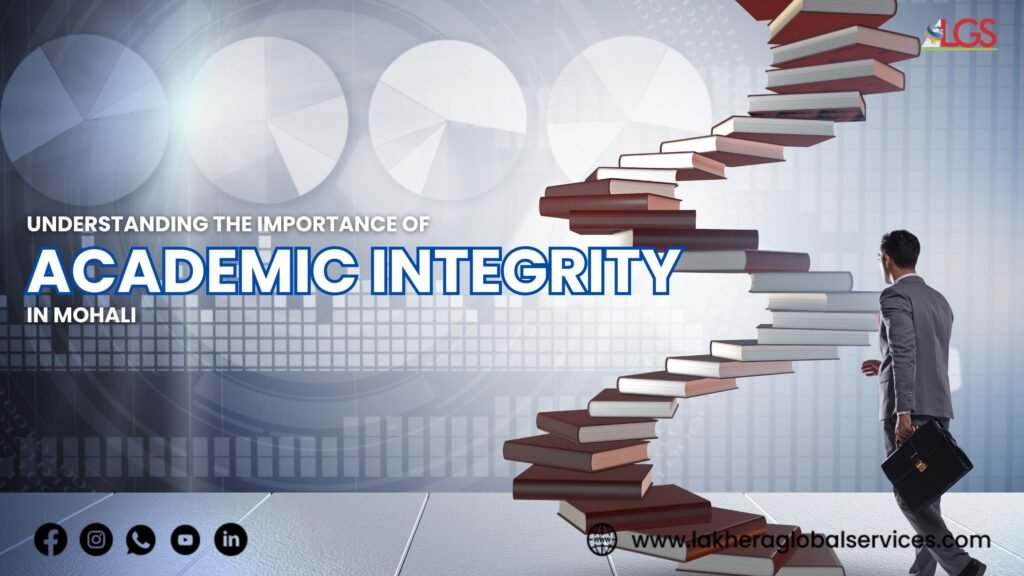In the rapidly evolving academic landscape of Mohali, where educational institutions are striving to deliver excellence and attract both local and international students, one core value must never be compromised—academic integrity. Whether you are a college administrator, educator, or student, understanding the importance of academic integrity is vital for creating a culture of trust, fairness, and long-term success.
Why This Topic Matters
Academic institutions in Mohali are increasingly focusing on global collaboration, online assessments, and high-quality research. As these opportunities expand, so does the potential for unethical academic behavior. Maintaining academic integrity isn’t just about avoiding plagiarism—it’s about upholding values that shape the reputation of institutions and the credibility of their graduates.
What You’ll Learn in This Blog
- Definition and dimensions of academic integrity
- Why academic integrity is crucial in Mohali’s educational ecosystem
- Common academic violations and their long-term impact
- How institutions can promote ethical learning
- Tools and policies for maintaining integrity
- Role of technology in preserving academic honesty
- Real-world examples from leading Mohali institutions
What Is Academic Integrity?
Academic integrity refers to the ethical code and moral principles followed in academics. It involves honesty, trust, fairness, respect, and responsibility in all aspects of education—from writing papers to conducting research and sitting for exams.
The Five Pillars of Academic Integrity
- Honesty – Being truthful in your work and avoiding plagiarism.
- Trust – Building a reputation that peers and professors can rely on.
- Fairness – Following the rules and not gaining an unfair advantage.
- Respect – Valuing the ideas and contributions of others.
- Responsibility – Being accountable for your own learning.
Why Academic Integrity Is Crucial for Mohali’s Institutions
As Mohali grows into an education hub with institutes offering advanced technical and professional courses, upholding academic standards has become non-negotiable.
1. Builds Institutional Reputation
Institutions known for integrity attract better faculty, industry partnerships, and more credible students. A reputation for academic excellence is hard to earn and easy to lose.
2. Improves Student Employability
Employers seek graduates who can think independently, solve problems, and demonstrate strong work ethics. Academic dishonesty can damage this image permanently.
3. Prepares Students for Global Competition
Mohali institutions aiming to place students in global universities or jobs must align with international education standards, where academic misconduct is taken very seriously.
4. Reduces Legal and Accreditation Risks
Colleges engaging in unethical grading or research practices risk losing accreditation and legal penalties. Maintaining transparency safeguards the institution’s future.
Common Academic Violations in Colleges
Understanding what constitutes misconduct is the first step to avoiding it.
Types of Violations
- Plagiarism – Copying without credit
- Cheating – Using unauthorized help during assessments
- Fabrication – Falsifying data or citations
- Facilitation – Helping others commit academic fraud
- Ghostwriting – Paying others to write on your behalf
Real Impact of Violations
- Suspension or expulsion
- Damage to academic and professional records
- Loss of scholarships and campus opportunities
- Legal consequences in case of fraud
How Institutions in Mohali Can Promote Academic Integrity
Educational institutions need to take a proactive approach to build a culture of ethics.
1. Establish a Clear Honor Code
Define acceptable and unacceptable behaviors. Make students sign a code of conduct that sets expectations right from orientation.
2. Train Educators and Staff
Faculty members should be trained to identify red flags like plagiarism, reused submissions, or unusually perfect exam scripts.
3. Include Ethics in Curriculum
Courses that teach ethics, research integrity, and academic honesty can shape better student behavior across disciplines.
4. Conduct Regular Integrity Workshops
Monthly or semester-wise workshops should be conducted to refresh academic ethics, especially around exams and project submission dates.
Leveraging Technology to Maintain Integrity
In a digital-first environment, Mohali colleges can harness tech tools to identify and prevent academic misconduct.
Popular Tools and Software
| Tool | Function | Usage |
| Turnitin | Plagiarism checker | Detects copied content |
| ProctorU | Online proctoring | Monitors live online exams |
| Grammarly | Grammar + originality | Helps maintain content quality |
| Moodle/Canvas LMS | Assignment tracking | Detects submission patterns |
Tip:
Use AI detection tools to spot generated or rewritten content. Set strict file submission rules and track IP addresses for authenticity.
Role of Students in Upholding Integrity
Students must take ownership of their learning. Encouraging them to follow the rules helps build a collaborative learning environment.
Strategies for Students:
- Plan assignments in advance to avoid last-minute copying.
- Use citations and references wherever necessary.
- Avoid shortcuts during online assessments.
- Help peers learn rather than giving them direct answers.
The Future of Ethical Learning in Mohali
With an increasing number of students participating in online learning, internships, and international applications, institutions in Mohali have a responsibility to equip them not only with knowledge but with values that last.
Ethical education doesn’t just impact academic performance—it shapes careers, confidence, and character.
1. Integration of Ethical Learning into Core Curriculum
In the coming years, more institutions in Mohali are expected to embed academic ethics into regular course structures. This won’t be limited to seminars or orientations—it will become part of continuous learning through:
- Case study analysis on real-world ethical dilemmas
- Critical thinking and writing modules focused on originality
- Ethical research training across all disciplines
This approach ensures students are not just told what to do, but are taught why it matters—building lifelong ethical habits.
2. Wider Use of AI and Data-Driven Tools
With advancements in AI, the detection of plagiarism, content spinning, or ghostwriting will become more efficient and nuanced. Institutions will increasingly use intelligent platforms that:
- Track writing style consistency across assignments
- Flag suspicious submission patterns or collaborative cheating
- Offer real-time feedback on citation and referencing errors
This shift will help institutions act as ethical mentors rather than just watchdogs.
3. Personalized Support for Struggling Students
Academic dishonesty often stems from fear of failure or lack of understanding. The future of ethical learning includes early intervention systems that use analytics to identify students at risk—academically or emotionally—and offer them tailored support like:
- Peer tutoring
- Extended deadlines with proper counseling
- Guided research assistance
This empathetic approach reduces the temptation to cheat by empowering students to succeed honestly.
4. Collaborative Learning with Shared Responsibility
Institutions in Mohali will also see a shift toward collaborative, project-based learning where peer reviews and group ethics are emphasized. By encouraging students to:
- Evaluate each other’s work fairly
- Acknowledge team contributions correctly
- Avoid freeloading or misrepresentation
colleges will create an environment where mutual accountability becomes a norm.
5. Industry-Integrated Integrity Training
With the rise of internships and job-ready programs, future academic integrity efforts will be closely tied to employer expectations. Companies hiring from Mohali’s colleges will value candidates who demonstrate:
- Independent thinking
- Original work ethics
- Professional honesty
Institutions will partner with industry leaders to conduct ethical workplace training, helping students transition seamlessly into careers without compromising values.
In Summary:
The future of ethical learning in Mohali isn’t just about catching cheaters—it’s about creating a culture that celebrates originality, promotes accountability, and empowers students to take pride in their honest work. By integrating ethics into pedagogy, technology, and student life, institutions in Mohali can lead the way in shaping a new generation of responsible, value-driven professionals.
Case Study: How an Institute Reversed Academic Misconduct
An engineering institute in Mohali noticed a rising trend in plagiarism during final year project reports. Instead of strict punishment, they took a developmental approach:
- Organized ethics workshops
- Created plagiarism awareness campaigns
- Introduced Turnitin for every department
- Allowed students to submit drafts for pre-checks
Result: Over two semesters, plagiarism dropped by 60%, and students reported a better understanding of research practices.
Conclusion: Academic Integrity Is a Non-Negotiable Standard
The importance of academic integrity is more than a rule—it is the cornerstone of a respected educational journey. For institutions in Mohali to thrive in a global academic ecosystem, they must foster an environment where honesty, respect, and responsibility are integral to every student’s experience.
At Lakhera Global Services Pvt Ltd, we assist educational institutions in not only building their digital identity but also promoting values like academic integrity through smart tech tools, campus outreach, and ethical content practices.
Ready to Create a Culture of Academic Excellence?
Connect with us to implement integrity-focused strategies and branding for your institution.
Visit: www.lakheraglobalservices.com
FAQs: Importance of Academic Integrity
1. What are the consequences of academic dishonesty?
Penalties may include suspension, revocation of grades, expulsion, or blacklisting from future opportunities.
2. How can technology help maintain academic integrity?
Tools like Turnitin and ProctorU help monitor plagiarism and cheating, especially during online learning.
3. Can institutions reverse the culture of cheating?
Yes. With the right training, tools, and communication, students can be guided toward ethical learning.
4. Is academic integrity just the student’s responsibility?
No. Faculty, administrators, and students must work together to uphold academic ethics.
5. How can Lakhera Global Services support academic integrity initiatives?
We offer digital solutions like LMS integration, plagiarism check tools, and online ethics training to help institutions build integrity-focused ecosystems.









